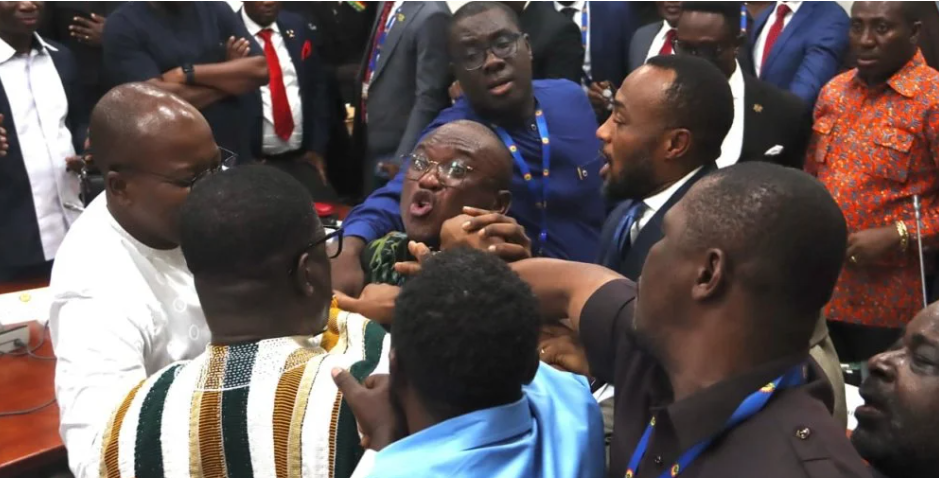The Ghanaian Parliament witnessed a tumultuous scene on Thursday, culminating in the suspension of four lawmakers following a violent altercation during a ministerial screening session. The incident, which involved overturned furniture, destroyed microphones, and physical exchanges between members, stemmed from heightened tensions between the ruling National Democratic Congress (NDC) and the opposition New Patriotic Party (NPP). Speaker Alban Bagbin, decrying the behavior as a “gross affront to the dignity of parliament,” announced a two-week suspension for Rockson Dafeamakpor, Frank Annor-Dompreh, Alhassan Tampuuli, and Jerry Shai. This act of parliamentary pugilism underscores the deep-seated political divisions within Ghana’s legislature and raises concerns about the erosion of decorum and productive discourse within the nation’s highest legislative body.
The immediate catalyst for the brawl was the vetting of ministerial nominees put forth by the ruling NDC. Opposition NPP members accused the vetting committee of attempting to rush the process, while NDC members countered that the opposition was deliberately obstructing proceedings through excessively prolonged questioning. The flashpoint arrived during the interrogation of Samuel George, the nominee for communications minister, by NPP parliamentary leader Alexander Afenyo-Markin. Afenyo-Markin’s questioning, which stretched for over five hours, ignited simmering frustrations amongst committee members, ultimately triggering the physical confrontation. This incident highlights the fragility of parliamentary processes in Ghana and the potential for political disagreements to escalate into disruptive and undemocratic behavior.
Speaker Bagbin’s swift action in suspending the four lawmakers reflects a determination to address the escalating tensions and uphold the integrity of Parliament. The two-week suspension serves as a direct reprimand for the involved members and sends a message that such conduct will not be tolerated. Furthermore, a seven-member special committee has been established to conduct a thorough investigation into the incident, with a mandate to submit its findings within ten days. This investigative process aims to determine the specific sequence of events, identify those primarily responsible, and recommend further actions to prevent similar occurrences in the future. The Speaker’s decision to deduct the cost of repairing the damaged parliamentary property from the allowances of those deemed responsible adds a financial dimension to the penalties and emphasizes the principle of accountability.
This latest eruption of violence within Ghana’s Parliament is not an isolated incident but rather part of a troubling pattern of physical confrontations during legislative proceedings. Similar clashes have marred parliamentary sessions in recent years, notably during the 2021 speaker election and debates surrounding the electronic transaction levy bill. This recurring theme of physical altercations points to a deeper malaise within the Ghanaian political landscape, characterized by heightened polarization, a lack of mutual respect between opposing parties, and a willingness to resort to physical intimidation rather than constructive dialogue. These recurring incidents raise serious questions about the ability of Ghana’s Parliament to function effectively as a deliberative body and to uphold the principles of democratic governance.
The repeated instances of physical confrontations innerhalb Ghana’s Parliament necessitate a comprehensive reassessment of the underlying causes and the implementation of effective measures to prevent future occurrences. Beyond addressing the immediate consequences of each incident, it is crucial to cultivate a culture of respect, dialogue, and compromise within the legislature. This requires fostering greater understanding and communication between opposing parties, promoting adherence to parliamentary rules and procedures, and establishing mechanisms for conflict resolution. Furthermore, strengthening the capacity of parliamentary staff to manage and de-escalate tensions can play a vital role in preventing situations from spiraling into violence.
The events of Thursday serve as a stark reminder of the fragility of democratic institutions and the importance of upholding the principles of decorum, respect, and peaceful deliberation. The violent altercation in Ghana’s Parliament is not merely an internal matter but reflects broader societal trends and has


